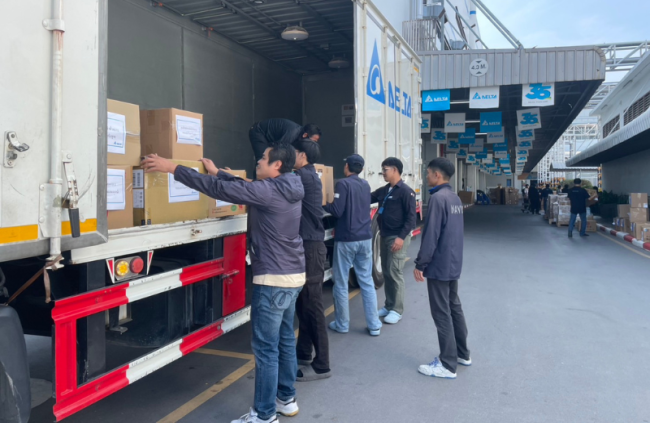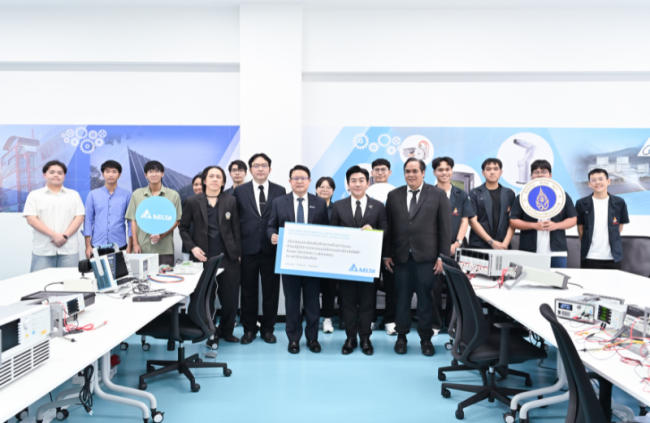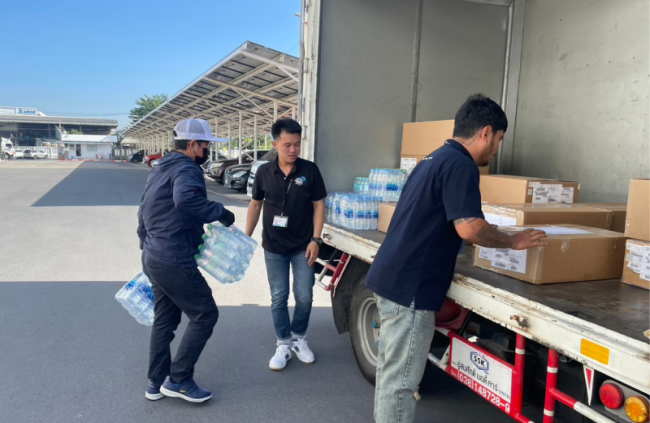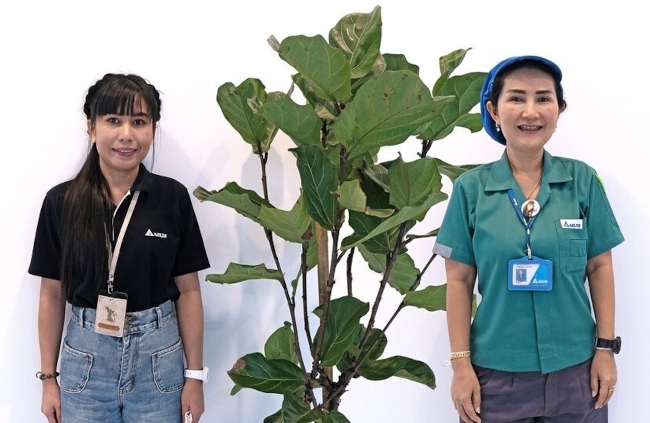Empowering Women’s STEM Careers at Delta Thailand
By David Nakayama - Published November 16, 2020
 Interview with DET STEM women Benchawan Saengwato and Natthaya Jangphanit
Interview with DET STEM women Benchawan Saengwato and Natthaya Jangphanit
Text and Photos by David Nakayama, DET Corp Comms
Bangkok, Thailand, November 10, 2020- While Delta Electronics Thailand is famous as a major manufacturer in the country, it may surprise you that women make up over 70% of our workforce. In fact, women are key to the electronics manufacturing sector and everyday talented women at Delta find fulfillment in a variety of Science, Technology, Engineering, Mathematics (STEM) careers.
Today we catch up with two young and ambitious STEM career women, Credit Specialist Benchawan Saengwato and Automation Engineer Natthaya Jangphanit (left to right in the above picture), who share their experiences at Delta and views on female empowerment in the manufacturing workplace and society.
Can you share your education and professional experience?
Natthaya: I graduated from King Mongkut’s University of Technology Thonburi (KMUTT) with a Bachelor in Electronics and Telecommunications Engineering. In my third year of university, I attended a job fair at my campus and discovered the Delta International Intern Program. I joined the six-month program and got a scholarship to train and work for two months at Delta Thailand and four months at Delta Taiwan.
As a Delta engineering intern. I joined the Product Engineering (PE) department to do failure analysis work. In Taiwan, I studied SCARA robot and Chinese language at the National Taipei University of Technology while working. After graduating, I joined Delta Thailand.
Benchawan: I got a Bachelor in Business Administration for Finance at Khon Kaen University and an MBA at the Asian Institute of Technology in Rangsit with a Thai Royal Government scholarship. During my MBA, I did a six-month exchange at Technische Universität München (TUM) in Germany.
I worked for five years as a credit analyst at a major Thai paper manufacturer before my MBA and nine months in investor relations (IR) at a top Thai industrial estate company before joining Delta Thailand.
When did you join Delta Thailand and what is your current role? Natthaya: I joined the Delta Thailand Automation Engineering Department in July 2020. I’m the only woman in my nine-person Project Automation team which designs automation machines for the Implementation Automation team, who then set them up on our original smart manufacturing production line solution called-Delta Smart Manufacturing (DSM) line. Our goal is to increase automation on the DSM production lines to reduce dangerous and repetitive manual tasks in production which improves efficiency, safety and quality.
Natthaya: I joined the Delta Thailand Automation Engineering Department in July 2020. I’m the only woman in my nine-person Project Automation team which designs automation machines for the Implementation Automation team, who then set them up on our original smart manufacturing production line solution called-Delta Smart Manufacturing (DSM) line. Our goal is to increase automation on the DSM production lines to reduce dangerous and repetitive manual tasks in production which improves efficiency, safety and quality.
We test and inspect the production line to decide our automation machine’s function and form requirements. Then, I use AutoCAD and SolidWorks software to design the machine’s structure. My favorite task is connecting our completed machines to send real-time PQM (Production, Quality, Machine) data to the Manufacturing Execution System (MES) that’s on our internal cloud.
Benchawan: I just joined the Finance Department in October as a credit controller and support the Delta sales teams who want to sell with credit or with L/C payment methods. I check the customer’s credit limit and then I’ll work with our trade insurance provider to verify and secure the customer’s credit limit with us. During this review process, I need to go over all the customer’s financial statements and sales forecasts to determine the right credit limit. I also manage our corporate insurance coverage.
What attracted you most about Delta, and what is your impression of the manufacturing sector so far?
Natthaya: Delta is a technologically advanced company that’s not only focused on production but also protects the environment. Most importantly, I’m impressed with the company’s care for employee safety in production like how we work to reduce workplace accidents to zero.
I think Thailand’s manufacturing sector is pretty smart, but not at the level where we don’t have anyone on the line. I think total automation rollout is still a long way away even for a company like Delta.
Benchawan: The most attractive part about working at Delta is my job scope. I also think Delta is a very sustainable company and I like our eco products like EV chargers and solar inverters. At my interview, the Finance manager and our CFO shared the company mission and vision, which convinced me to join.
Compared with the banking sector, Thailand’s manufacturing sector is a lot broader and we can get involved in different interesting products and businesses throughout our careers. I prefer to work in manufacturing because it’s always developing and innovating whereas finance is more or less supporting our growth. I can also learn more about global business culture and international business at a multinational to diversify my skill set.
How do you think the manufacturing sector is evolving for women in Thailand, and what goals do you have in your career? Benchawan: By 2019 Thailand’s female population was over 50% so there we have plenty of opportunities to diversify manufacturing. I think Thailand is very open these days and the manufacturing sector doesn’t divide jobs up by gender roles so women with the potential and ability can succeed.
Benchawan: By 2019 Thailand’s female population was over 50% so there we have plenty of opportunities to diversify manufacturing. I think Thailand is very open these days and the manufacturing sector doesn’t divide jobs up by gender roles so women with the potential and ability can succeed.
I want to get the Financial Conduct Authority (FCA) certificate within five years as only 500 FCA holders are in Thailand now and I want more domestic and international opportunities. If possible, I’d want to become a Finance Department manager at Delta. I hope for the chance to prove my abilities and hope the company will recognize my value by promoting me in two years.
Natthaya: Nowadays women have a lot of opportunities in manufacturing. For example, I see female technicians working in wave soldering which used to be male-dominated because it’s in a tough environment and is demanding labor. I think more and more women will succeed in manufacturing as we show everyone how we can contribute.
My current goal is to learn all the technology I can at Delta including automation, factory environment management, energy-saving and people management. In the future, I plan to apply this knowledge to develop automated electronics in my hometown. First, I want to become a team leader then become an engineering director within 10 years. Finally, I want to set up my own automation engineering firm to create new machines that no one has ever seen.
How do you think that women in Thailand can be more active in STEM careers and management?
Natthaya: When I was 16, I loved math and physics so much that I studied engineering. At KMUTT, 60% of the engineering faculty students were female and many of my classmates now work in engineering-related fields including R&D, engineering sales and IT security. In electronics class, I only learned about soldering and PCB boards, so I learned everything about machines on the job at Delta.
I think us women have to develop our careers by ourselves. We should always gain experience and offer value. Your boss can support your development, but we may need to adapt to working in a professional engineering team at a manufacturing site. First, make sure that you can do the job and then show your boss and team what you can do. My entire team works together in one room, so we’re always discussing our problems and consulting with each other. So women need to be brave enough to express our own ideas and opinions.
Benchawan: You need a firm foundation in mathematics and sound logic to work in finance. Finance isn’t routine work and it can change depending on scenarios. We also must study basic business law. Around 70% of my university class was female and many of my female friends have careers in engineering or finance and some are successful managers. I think women in Thailand are lucky to live in a society that doesn’t force any fixed roles on women, especially compared with certain other Asian countries.
What do you think are the most unique ways that women can contribute to their workplaces and society? Natthaya: Both men and women bring a natural balance to the world. In a company or society, we can’t just have one or the other. Each side has their own strengths. Women will have views that men never expect. For example, I can find minor details in machines and designs that the men overlook.
Natthaya: Both men and women bring a natural balance to the world. In a company or society, we can’t just have one or the other. Each side has their own strengths. Women will have views that men never expect. For example, I can find minor details in machines and designs that the men overlook.
Benchawan: I feel the nature of women is more caring and we don’t communicate aggressively but try to solve problems together. Women are often more careful and detailed and can sense something is missing. Whereas men tend to focus more on results. So in business, we sometimes need daring men who can make decisions faster and then cautious women to help minimize risks. I think Thai society is quite equal as we’ve had a female PM previously and Thai women are free to participate equally in the workplace.
How important is female empowerment to society, and how can we give opportunities to women in our daily work and support their growth?
Natthaya: I’m very lucky to have friendly workmates and supportive seniors and supervisors. I think everyone, including women, should try to prove their ability when they first start out. My supervisor sees this effort and assigns the right tasks for everyone on the team. I think society should be fair for all too.
Benchawan: Female empowerment is important because some women may still have the mindset that they cannot manage or lead. So when they see good examples of women leaders, they can gain the confidence to get out of their comfort zone and find out that they can do what they put their mind to
Women must be more active and take the opportunities that society gives them. Never give up even after failing. I may change my course, but I always go for the same goals. Managers should never look at an employee’s gender, they should only consider their performance and attitude to assess their performance.
What would you tell Thai school girls who are interested in studying and working in a STEM field?
Natthaya: I’d say you have to be brave and chase your dream. Right now many women graduate every year in STEM subjects. If you’re passionate, you can motivate yourself to succeed. If you want to be an engineer, I think the most important skills to learn are computer programming and coding skills because these are useful in all engineering fields.
Benchawan: First, don’t limit yourself because of your gender. If you dream of working in a STEM job, then go ahead. If you enjoy finance, then start building a foundation in mathematics and English. Some Thais say English is just an accessory skill but I totally disagree. I think it’s a tool that can help you go farther in life.
You should also practice your logic by working with financial formulas in business scenarios. Excellent research and logical thinking will help you make useful analyses and even forecasts. Get to understand the principles and theory of economics such as the demand/supply curve.
 Are you a young woman looking to carve out your niche in STEM in an empowering and international work environment? Let’s get in touch today and talk about how we can work together to drive diversity and inclusion in Thailand at the Delta Thailand Careers Page!
Are you a young woman looking to carve out your niche in STEM in an empowering and international work environment? Let’s get in touch today and talk about how we can work together to drive diversity and inclusion in Thailand at the Delta Thailand Careers Page!







